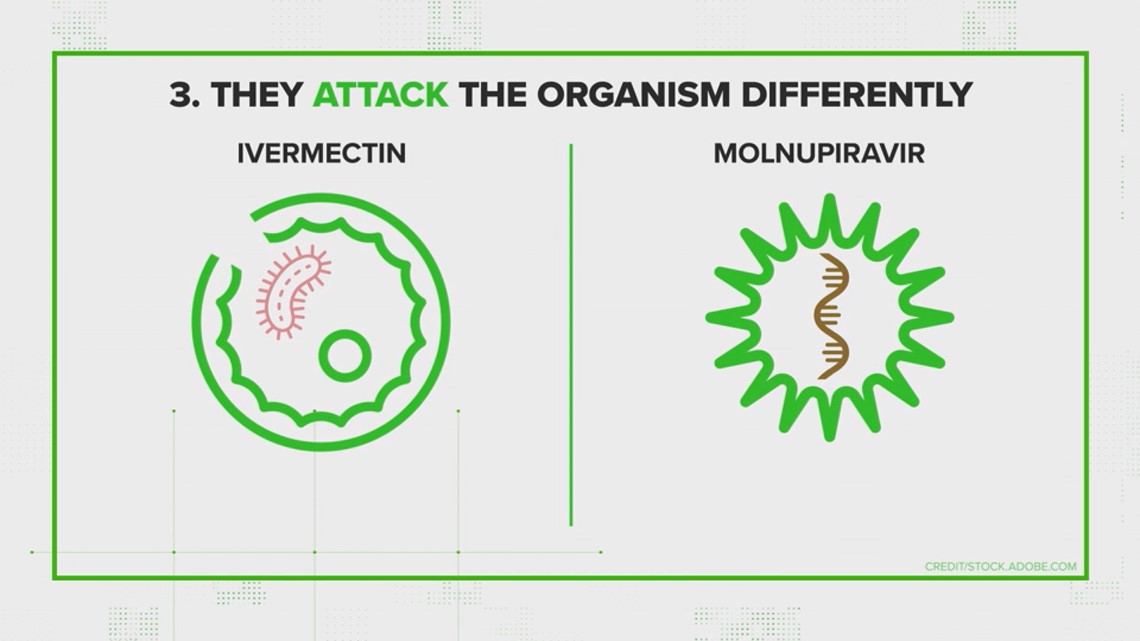WASHINGTON — Editor's Note: In a previous version of this story and the video above, the term 'mRNA viruses' was used instead of 'RNA viruses.' The story has been corrected.
Pharmaceutical company Merck applied to the Food and Drug Administration (FDA) for emergency use authorization (EUA) for its investigational COVID-19 pill 'Molnupiravir,' on Oct. 11.
The EUA submission comes 10 days after the company announced that its pill reduced the risk of hospitalization and death in mild and moderate COVID-19 patients by 50%.
Amid the news, some people online are claiming Merck's new drug— Molnupiravi— is a rebranded version of Ivermectin. Parent company Merck also produces Ivermectin under the brand name Stromectol for human use.
Ivermectin has become infamous as some people were reportedly taking the deworming drug at toxic levels typically meant for animals like horses and cows.
THE QUESTION:
Is Molnupiravir the same as Ivermectin?
THE SOURCES:
- Dr. Ashu Tripathi- Director of Natural Products Discovery Core and Assistant Professor/Research of Medicinal Chemistry at the University of Michigan
- Dr. Namandje Bumpus- Professor and Director of the Department of Pharmacology and Molecular Sciences at Johns Hopkins University
THE ANSWER:
This claim is false—Molnupiravir is not the same as ivermectin.
WHAT WE FOUND:
Right off the bat, both Dr. Tripathi and Dr. Bumpus verified that this claim is false. Dr. Tripathi said it's like comparing Mars and the Moon.
So, we asked our experts exactly how they’re different, and found at least four ways:
- They’re chemically different, meaning the structure of the molecules is not the same. According to the National Center for Biotechnology Information, a department within the National Institutes of Health's National Library of Medicine, the two have very different chemical structures. Ivermectin's formula is C48H74O14, while Molnupiravir's is C13H19N3O7
- The organism they attack is different. Ivermectin attacks parasites. While the new Merck drug attacks RNA viruses.
- They attack each organism differently. Ivermectin ruptures the cell membrane, which paralyzes and kills the parasite. While Molnupiravir corrupts the mRNA inside the cell, preventing the virus from replicating effectively.


4. The drugs are used to treat two completely different conditions. Ivermectin treats conditions caused by certain parasites. It's approved orally to treat intestinal strongyloidiasis and onchocerciasis (also known as river blindness) and topically to treat head lice and rosacea. Molnupiravir, on the other hand, is being studied to treat COVID-19. Right now, there is no evidence that Ivermectin treats COVID-19.
Dr. Bumpus said those differences will become even starker as more information becomes public during Molnupiravir's emergency use evaluation.
"All of this has to be disclosed, reported, in order to get the authorization," Dr. Bumpus said. "So it's really not in the interest of moving this product forward to misrepresent in that way, because certainly any of that would become very obvious during the process of the FDA looking very closely at all of these data."

